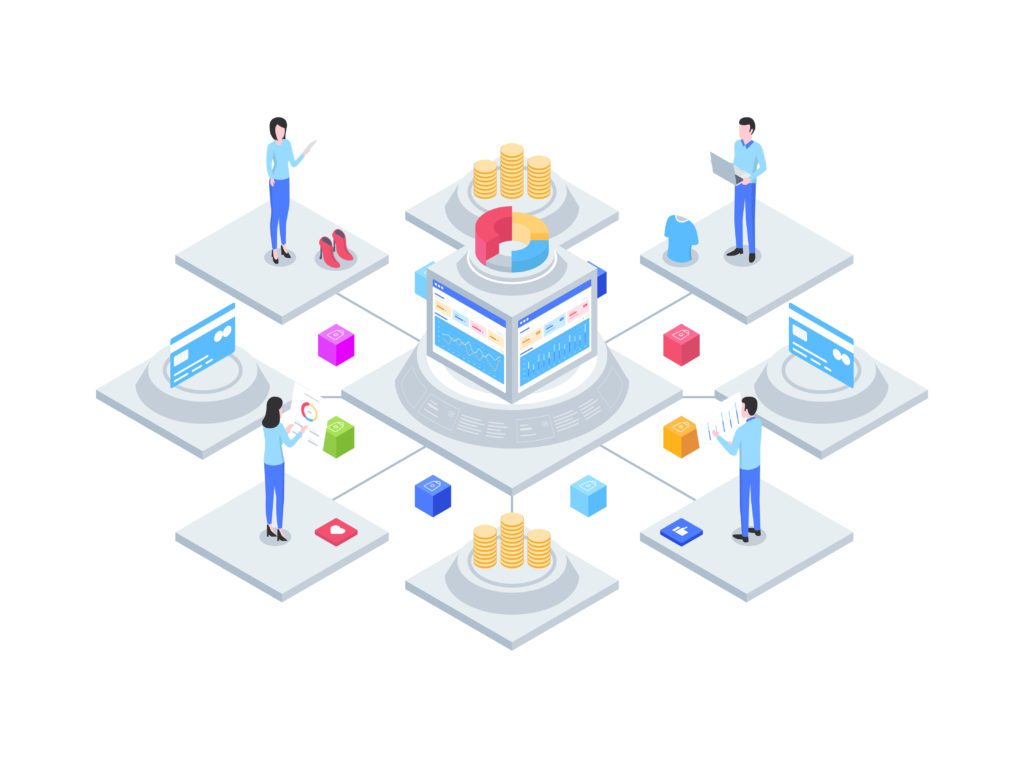
Like two sides of the same coin, customer relationship management (CRM) and enterprise resource planning (ERP) function together to keep your business running smoothly. Though they have a lot in common and are therefore often used interchangeably, they each contribute their own essential functions to your business. In short, ERP pertains to internal business functions, while CRM is external-facing and manages customer data. However, when paired together, CRM and ERP’s integration is greater than the sum of their individual parts.
Also read: CRM vs ERP: What Are the Key Differences?
What is ERP software?
Enterprise resource planning (ERP) software manages internal resources to ensure a streamlined workflow. This technology streamlines essential business functions such as human resources, accounting, and supply chain management. ERP software aggregates and unifies data across these various departments under a singular interface. An ERP system can even be combined with a PIM to enrich product data; this is especially useful for small to medium businesses.
What is CRM software?
Customer relationship management (CRM) software manages all business interactions with current and potential customers. It is most relevant to the marketing, sales, and customer service functions. CRM software stores information such as leads, customers’ transaction histories, product returns, account numbers, purchasing team information, and more.
How do ERP and CRM work together?
Customer relationship management and enterprise resource planning systems tend to work with related data. Consequently, many vendors such as Acumatica, Microsoft Dynamics, Netsuite ERP, and SYSPRO consolidate CRM and ERP into one comprehensive portal. In ERP software, CRM is sometimes offered as an add-on for additional charge.
How ERP and CRM work together is best represented through a manufacturing example. When the ERP and CRM data are integrated, ERP software can perform the following functions more successfully to ensure timely order fulfillment:
- Securing enough materials in a timely manner through a Materials Requirement Planning (MRP) system
- Scheduling enough employees to work each shift
- Plan routine machine maintenance
- Procure railcars, trailers, and charter planes to ship finished products to customers
When the customer receives their order, any feedback that salespeople receive about the product—regarding quality, delivery, or mechanical or technical issues—transfers from the CRM to the ERP platform. With this information, plant managers are better informed of the manufacturing site’s performance in supply chain management, employee data, or product management.
Depending on customer feedback received through the CRM platform, the plant manager may look at supply chain data in the ERP and correlate poor product quality with a particular supplier and decide to switch.
If the issue is late product deliveries, the plant manager may find within employee data in the ERP that too few workers are scheduled during the second shift and adjust shift planning accordingly or hire more workers.
If customer complaints signal mechanical issues, that information should influence the research and development and/or the product development team’s data in the ERP so they can work on an improved design.
Read more at TechnologyAdvice.com: 5 Ways ERP and CRM Integration Benefits Manufacturers
Benefits of ERP and CRM integration
Enterprise resource planning and customer relationship management software solutions make a powerful partnership that helps your business achieve its goals. Pairing ERP and CRM benefits company culture, management, HR, and the research and development team through communication, planning, and product information, respectively.
Communication
Organizations work best when information silos are broken down. Customer data in the CRM platform is a goldmine of information that informs much of the business’s back-end.
Leverage insights from customer feedback, purchasing patterns, and more to gauge how well your company is performing in areas like production, customer service, and more. Opening CRM data to the rest of the organization promotes transparency and empowers cross-functional collaboration among employees to solve problems.
Planning
Enterprise resource planning that integrates customer relationship management helps improve business planning. Based on CRM data, a business can better anticipate ebbs and flows in production, delivery needs, and the people and materials required across the supply chain.
CRM data related to newly closed deals or service renewals triggers a cascade of upchain planning to meet order fulfillment goals.
Product/service quality
Integrating your CRM solution with your ERP system helps your business improve product or service quality, based on salespeople’s interactions with clients.
Customer dissatisfaction is a reflection of a company’s internal product or service issues that need to be addressed. When accounting data shows unprecedented returns or when the same complaint gets registered in the CRM, a good ERP system will alert management and point to a bigger internal issue. Effectively addressing product or service issues will reflect happier customer data in the CRM.
ERP & CRM: Better together
Customer feedback is the prime source of information about how your company is performing and how it can do better. As such, ERP and CRM should mutually inform one another in a feedback loop. When you know what’s going on with your customers—what they’re buying, in what quantities, how they like the product, and other measures—you should leverage that data to inform back-end company functions.
When your ERP and CRM solutions are integrated, you can use the streamlined data to improve your business performance and drive customer loyalty.
Read next: Best ERP Systems for 2022